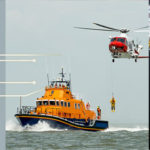
To foster the development of new reliable products and services, two European Satellite Navigation Competition (ESNC) Special Prizes, presented by the German Aerospace Center (DLR) and the German Federal Ministry of Transport and Digital Infrastructure (BMVI), award outstanding prizes to innovative applications based on GNSS.
DLR: Robust means trust – GALILEO for reliable positioning
BMVI: PRS applications – Reliable services for a secure digital society
Participants of the ESNC now have the chance to actively help implement the new EU space strategy, and shaping the future of Galileo. Former ESNC winners already proved great support to pave the way for Galileo Initial Services. This year’s participants are called to sign up with their path breaking business idea to provide Europe with top-notch Galileo based services.
Direct Support from Leading German Research & Governmental Entities
The winner of the DLR Special Prize receives a voucher for five man-months of DLR services to push the development of their business idea. This prize bundle boost includes state-of-the-art technical support for research activities, access to testing and simulation facilities, DLR’s expert advice, as well as feasibility or concept studies. These services have the ultimate goal to promote the business idea’s realisation.
The BMVI Special Prize awards a voucher worth EUR 5,000 to support the further development of the idea to the winners. In addition, the winners will benefit from the German government promoting their idea. All participants have the great opportunity to demonstrate their expertise to the political decision makers of BMVI.
Sign up now for the DLR and BMVI Special Prizes and submit your robust or safety-critical solution until 30 June 2017.
DLR and BMVI Want Future-Oriented Ideas
Galileo, Europe’s flagship GNSS pogramme, is a driver for various new applications targeting a broad field from mass market to professional, governmental and safety-critical purposes. Along with Galileo applications new challenging requirements have to be fulfilled targeting especially at a robust, resilient and ubiquitous provision of navigation information. This includes positioning in challenging environmental conditions such as e.g. in dense urban scenarios, in areas with potential radio interference or other types of radio propagation. When it comes to safety-critical areas, Galileo PRS, an encrypted navigation service for governmental authorised users and sensitive applications that require high continuity, is an important asset for safety-critical areas.
The aim of the ESNC’s DLR Special Prize is to make maximum benefit available for the user community. This is achieved by triggering new applications and solutions to meet current and future needs in terms of reliability and security. Therefore, DLR is searching for solutions in two focus topics: Resilient GNSS, and Early Services and Applications. It is important for idea submissions to provide technical and application oriented solutions, preferably fusing GNSS data with other information. Additionally, the use of GNSS in a stand-alone or Multi Constellation context is suggested.
BMVI’s Special Prize of the ESNC specifically calls new applications with good balance between security, user needs, and innovation potential. Above all, the relevance to Galileo PRS combined with practical feasibility are the two most important characteristics for idea submissions. Moreover, the commercial benefits and degree of innovation in terms of added value are important criteria. Apprehend the possibilities robust space services provide to improve safety, security, and emergency-related issues.
